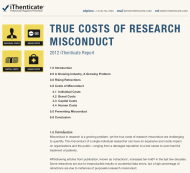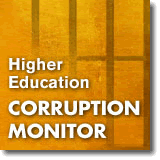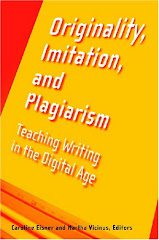These days, students can hire online companies to do all their
coursework, from papers to final exams. Is this ethical, or even legal?
A colleague tells the following story. A student in an undergraduate
course recently submitted a truly first-rate term paper. In form, it was
extremely well crafted, exhibiting a level of writing far beyond the
typical undergraduate. In substance, it did a superb job of analyzing
the text and offered a number of trenchant insights. It was clearly
A-level work. There was only one problem: It markedly exceeded the
quality of any other assignment the student had submitted all semester.
The instructor suspected foul play. She used several
plagiarism-detection programs to determine if the student had cut and
pasted text from another source, but each of these searches turned up
nothing. So she decided to confront the student. She asked him point
blank, "Did you write this, or did someone else write it for you?" The
student immediately confessed. He had purchased the custom-written paper
from an online essay-writing service.
The teacher believed this conduct represented a serious breach of
academic ethics. The student had submitted an essay written by someone
else as his own. He had not indicated that he hadn't written it. He
hadn't given any credit to the essay's true author, whose name he did
not know. And he was prepared to accept credit for both the essay and
the course, despite the fact that he had not done the required work. The
instructor severely admonished the student and gave him an F for the
assignment.
But the roots of this problem go far deeper than an isolated case of
ghostwriting. Essay writing has become a cottage industry premised on
systematic flaunting of the most basic aims of higher education. The
very fact that such services exist reflects a deep and widespread
misunderstanding of why colleges and universities ask students to write
essays in the first place.
These services have names such as WriteMyEssay.com, College-paper.org, and Essayontime.com. Bestessays.com
claims that "70% of Students use Essay Writing service at least once
[sic]" and boasts that all its writers have M.A. and Ph.D. degrees. Some
of these Web sites offer testimonials from satisfied customers. One
crows that he received a B+ on a ghostwritten history essay he submitted
at a prestigious Ivy League institution. Another marvels at the
scholarly standards and dedication of the essay writers, one of whom
actually made two unsolicited revisions "absolutely free." Another
customer pledges, "I will use your essay writing service again, and
leave the essay writing to the professionals."
Such claims raise troubling questions. First, is the use of these
services a form of plagiarism? Not exactly, because plagiarism implies
stealing someone else's work and calling it one's own. In this case,
assuming the essay-writing services are actually providing brand-new
essays, no one else's work is being stolen without consent. It is being
purchased. Nevertheless, the work is being used without attribution, and
the students are claiming credit for work they never did. In short, the
students are cheating, not learning.
Most essay-writing services evince little or no commitment to helping
their customers understand their essay topics or hone their skills as
thinkers and writers. They do not ask students to jot down preliminary
ideas or submit rough drafts for editing and critique. They do not even
encourage them to pose questions about the subject matter. Instead, the
services do all the work for them, requesting only three things: the
topic, the deadline, and the payment.
Second, how do these essays manage to slip past an instructor
undetected? If most institutions knew their students were using
essay-writing services, they would undoubtedly subject them to
disciplinary proceedings. But the use of such services can be difficult
to detect, unless the instructor makes the effort to compare the content
and quality of each essay with other work the student has submitted
over the course of a semester. But what if the entire semester's work
has been ghostwritten?
Another disturbing question concerns the writers who produce such
essays. Why would someone who has earned a master's degree or Ph.D.
participate in such ethically an dubious activity? One answer may be
that many academics find themselves in dead-end, part-time teaching
positions that pay so poorly that they cannot make ends meet, and essay
writing can be quite a lucrative business. For students who can wait up
to 5 days, one service charges $20 per page, but for those who need the
essay within 16 hours, the price quadruples to $80 per page. The "works
cited" portion of essays can generate additional revenue. The same
service provides one reference per page at no additional cost, but if
students feel that they need more citations, the charge is $1 per
source. Some struggling academics may also view ghostwriting as a form
of vengeance on an educational system that saddled them with huge debts
and few prospects for a viable academic career.
A far deeper question is this: Why aren't the students who use these
services crafting their own essays to begin with? Some may simply be
short on time and juggling competing commitments. As the cost of college
continues to escalate, more and more students need to hold down
part-time or even full-time jobs. Some are balancing school with
marriage, parenthood, and other family responsibilities. The sales pitch
of the essay-writing services reassures students that they are learning
what they need to know and merely "lack the time needed to get it down
on paper."
But more disturbingly, some students may question the very value of
writing term papers. After all, they may ask, how many contemporary jobs
really require such archaic forms of writing? And what is the point of
doing research and formulating an argument when reams of information on
virtually any topic are available at the click of a button on the
Internet? Some may even doubt the relevance of the whole college
experience.
Here is where the real problem lies. The idea of paying someone else
to do your work for you has become increasingly commonplace in our
broader culture, even in the realm of writing. It is well known that
many actors, athletes, politicians, and businesspeople have contracted
with uncredited ghostwriters to produce their memoirs for them. There is no law against it.
At the same time, higher education has been transformed into an
industry, another sphere of economic activity where goods and services
are bought and sold. By this logic, a student who pays a fair market
price for it has earned whatever grade it brings. In fact, many
institutions of higher education market not the challenges provided by
their course of study, but the ease with which busy students can
complete it in the midst of other daily responsibilities. The shrewd
shopper, it seems, invests the least time and effort necessary to get
the goods.
But when students outsource their essays to third-party services,
they are devaluing the very degree programs they pursue. They are making
a mockery of the very idea of education by putting its trappings -
assignments, grades, and degrees - ahead of real learning.. They're
cheating their instructors, who issue grades on the presumption that
they represent a student's actual work. They are also cheating their
classmates who do invest the time and effort necessary to earn their own
grades.
But ultimately, students who use essay-writing
services are cheating no one more than themselves. They are depriving
themselves of the opportunity to ask, "What new insights and
perspectives might I gain in the process of writing this paper?" instead
of "How can I check this box and get my credential?"
Some might argue that even students who use essay services are forced to learn something
in order to graduate. After all, when they sit down to take exams,
those who have absorbed nothing at all will be exposed. That may be true
in a traditional classroom, but these days, more and more degree
programs are moving online -- and in response, more and more
Internet-based test-taking services have sprung up. One version of
"Take-my-exam.com" called AllHomework.net
boasts, "Just let us know what the exam is about and we will find the
right expert who will log in on your behalf, finish the exam within the
time limit and get you a guaranteed grade for the exam itself."
And why stop with exams? Why not follow this path to its logical
conclusion? If the entire course is online, why shouldn't students hire
someone to enroll and complete all its requirements on their behalf? In
fact, "Take-my-course.com" sites have already begun to appear. One site
called My Math Genius
promises to get customers a "guaranteed grade," with experts who will
complete all assignments and "ace your final and midterm." And why
should the trend toward vicarious performance stop with education? How
long must we wait until some intrepid entrepreneur founds
""Do-my-job.com" or "Live-my-life.com?"
Meanwhile, the proliferation of essay-writing and exam-taking
services is merely a symptom of a much deeper and more pervasive
disorder. For that reason, the solution is not merely tougher laws and
stiffer penalties. We need a series of probing discussions in classrooms
all over the country, encouraging students to reflect on the real
purpose of education: the new people and ideas a student encounters, and
the enlightenment that comes when an assignment truly challenges a
student's heart and mind. Perhaps an essay assignment is in order?







